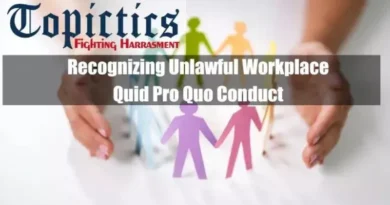Quid Pro Quo Sexual Harassment Legal Definition
The quid pro quo sexual harassment legal definition involves a situation where employment decisions, such as hiring, promotion, or retention, are based on the acceptance or rejection of unwelcome sexual advances or requests for sexual favors.
This type of harassment occurs when a person in a position of authority demands sexual favors from a subordinate in exchange for job benefits or to avoid negative employment consequences. It is considered a violation of employment law and can lead to significant legal consequences for both the perpetrator and the organization.
Takeaways
| Key Points |
|---|
| Quid pro quo sexual harassment is a legally recognized form of workplace harassment where an individual in a position of authority demands or implies that employment benefits, such as promotions or job security, are contingent upon sexual favors. |
| This type of harassment can be explicit, with direct demands for sexual conduct in exchange for professional advantages, or implicit, where the threat or offer is subtly suggested. |
| Under U.S. law, Title VII of the Civil Rights Act of 1964 prohibits quid pro quo harassment, making employers liable if they fail to prevent or address such misconduct, while California’s Fair Employment and Housing Act (FEHA) extends additional protections. |
| Victims have legal recourse through complaints to agencies like the Equal Employment Opportunity Commission (EEOC) or the California Department of Fair Employment and Housing (DFEH), with potential remedies including financial compensation, job reinstatement, and punitive damages. |
| Employers are legally obligated to implement strong anti-harassment policies, and failure to address complaints can result in lawsuits, financial penalties, reputational harm, and workplace instability. |
Explanation

Quid pro quo sexual harassment is a specific form of sexual harassment recognized under employment law. The term “quid pro quo” translates to “this for that” or “something for something.
In the context of sexual harassment, it refers to situations where submission to or rejection of unwelcome sexual conduct is used as the basis for employment decisions.
Key aspects of quid pro quo sexual harassment include:
- Authority and Power Dynamics: This type of harassment typically involves someone in a position of authority (such as a supervisor, manager, or employer) who uses their power to solicit sexual favors from a subordinate.
- Explicit or Implicit Conditions: The harassment can be explicit or implicit. Explicit quid pro quo harassment might involve direct statements or demands, such as, “If you sleep with me, you will get a promotion.” Implicit harassment might involve more subtle suggestions or implications that job benefits depend on compliance with sexual demands.
- Employment Consequences: The core of quid pro quo harassment is that employment decisions are contingent upon the acceptance or rejection of sexual advances. These decisions include hiring, firing, promotions, demotions, raises, or other benefits or detriments.
- Legality and Protections: Quid pro quo sexual harassment is illegal under various employment laws, including Title VII of the Civil Rights Act of 1964 in the United States. Employees who experience this form of harassment have legal recourse and can file complaints with entities such as the Equal Employment Opportunity Commission (EEOC).
- Impact on Victims: Victims of quid pro quo sexual harassment may suffer from emotional distress, job insecurity, and a hostile work environment. The power imbalance can make it difficult for victims to refuse the advances or report the harassment without fear of retaliation.
- Employer Liability: Employers can be held liable for quid pro quo sexual harassment if it is proven that the harassment occurred and that they did not take appropriate steps to prevent or address it. Employers are encouraged to implement and enforce strict anti-harassment policies, provide training to employees, and establish clear procedures for reporting and handling complaints.
Understanding quid pro quo sexual harassment is crucial for fostering a safe and equitable workplace.
Both employees and employers must recognize the signs, understand their rights and responsibilities, and take proactive measures to prevent and address harassment.

Quid Pro Quo Sexual Harassment Legal Framework
The legal framework for quid pro quo sexual harassment in the U.S. is based on federal laws like Title VII of the Civil Rights Act of 1964 and state laws such as the California Fair Employment and Housing Act (FEHA). These laws protect employees and hold both individuals and employers accountable for engaging in or tolerating quid pro quo harassment.
Title VII of the Civil Rights Act of 1964
Title VII is a federal law that prohibits employment discrimination based on sex, race, color, national origin, or religion. Quid pro quo sexual harassment falls under sex discrimination.
This type of harassment happens when someone in a position of power, such as a manager or supervisor, demands sexual favors in exchange for job benefits. If the employee refuses, they may face negative consequences like being fired or demoted, which is a violation of Title VII.
The Equal Employment Opportunity Commission (EEOC) enforces Title VII. The EEOC has clear guidelines on what counts as quid pro quo harassment and holds employers responsible if they fail to prevent or address it. Employers must take reasonable steps to prevent harassment, such as having anti-harassment policies in place and responding to complaints quickly.

California Fair Employment and Housing Act (FEHA)
The California Fair Employment and Housing Act (FEHA) offers more extensive protection than federal law and applies to smaller employers. FEHA covers various forms of discrimination, including harassment based on sex, race, religion, marital status, disability, and age.
FEHA specifically bans quid pro quo harassment and allows victims to take legal action through the California Department of Fair Employment and Housing (DFEH). If a corporate officer is involved or the company’s response is negligent, punitive damages can be imposed on employers. FEHA also allows victims to recover attorney fees and court costs if they win their case.
Consequences for Individuals
Individuals who are guilty of quid pro quo sexual harassment may face severe consequences such as suspension, demotion, or termination. They can also be held personally liable, meaning they may have to pay compensation for lost wages, emotional distress, and legal fees. In cases involving assault or coercion, they could face criminal charges under state or federal laws.
Consequences for Employers
Legal Obligations
Employers are required under Title VII to take steps to prevent and address sexual harassment in the workplace. If quid pro quo harassment occurs and the employer fails to take adequate action, they can be sued and forced to pay damages. They may also face civil penalties, especially if the harassment creates a hostile work environment.
Additional Consequences
Even if employers address the issue, they can still be held liable if their response is insufficient. Failing to maintain a harassment-free workplace can lead to lawsuits, financial penalties, and reputational harm. It may also result in negative publicity, employee dissatisfaction, and protests, which can severely damage a company’s operations and image.
Compensation and Legal Recourse

Victims’ Rights
Victims of quid pro quo sexual harassment can pursue several types of compensation, including lost wages, emotional pain and suffering, and punitive damages to penalize the employer or harasser for their actions.
Filing Complaints
Victims can file complaints with federal or state agencies like the EEOC or DFEH, which will investigate and may take legal action on behalf of the victim. Successful lawsuits can lead to reinstatement to their job or compensation for missed job opportunities.
Legal Help
It is recommended that victims consult employment attorneys to navigate the legal process, evaluate their cases, and represent them in negotiations or in court. Attorneys can also help victims settle disputes with employers.
Sexual and Non-sexual Quid Pro Quo
Here’s a comparison table between the sexual and non-sexual legal definitions of quid pro quo:
| Aspect | Sexual Quid Pro Quo | Non-Sexual Quid Pro Quo |
|---|---|---|
| Definition | Involves unwelcome sexual advances or requests for sexual favors in exchange for job benefits or to avoid negative consequences. | Involves exchanges of benefits or favors unrelated to sexual conduct, such as bribes or other forms of corruption. |
| Common Contexts | Workplace settings, educational institutions, and professional associations. | Business transactions, political dealings, and government contracts. |
| Examples | Supervisor demands sexual favors for a promotion. | Official demands a bribe to grant a business license. |
| Legal Framework | Covered under employment laws such as Title VII of the Civil Rights Act of 1964 in the U.S. | Covered under laws related to bribery, corruption, and fraud, such as the Foreign Corrupt Practices Act (FCPA). |
| Impact on Victim | Emotional distress, career setbacks, hostile work environment. | Financial loss, legal consequences, damage to professional reputation. |
| Employer Liability | Employers can be held liable if they fail to prevent or address harassment. | Organizations can face legal penalties and reputational damage for engaging in or allowing corrupt practices. |
| Reporting Mechanisms | Internal reporting to HR and external reporting to bodies like the EEOC. | Reporting to law enforcement, anti-corruption agencies, and internal compliance departments. |
| Preventive Measures | Anti-harassment training, clear reporting procedures, and strict enforcement of policies. | Anti-corruption training, transparent business practices, robust compliance programs. |
How to Cope with Quid Pro Quo Sexual Harassment?

Coping with quid pro quo sexual harassment can be challenging, but there are several steps individuals can take to protect themselves and address the situation effectively:
- Recognize the Behavior: Understand what constitutes quid pro quo sexual harassment. Knowing the definition and recognizing the signs is the first step in addressing the issue.
- Document Everything: Keep detailed records of the harassment, including dates, times, places, and descriptions of the incidents. Note any witnesses who might have observed the behavior. Documentation can be crucial if you decide to report the harassment.
- Seek Support: Talk to someone you trust, such as a friend, family member, or counselor. Emotional support can help you cope with the stress and anxiety that often accompany harassment.
- Know Your Rights: Familiarize yourself with your company’s policies on sexual harassment and understand your legal rights. Many countries have laws protecting employees from sexual harassment, such as Title VII of the Civil Rights Act in the United States.
- Internal Reporting: Follow your company’s procedures for reporting sexual harassment. This might involve speaking to a supervisor or HR representative or using a designated reporting system.
- External Reporting: If internal reporting does not resolve the issue, or if you feel unsafe doing so, you can file a complaint with external organizations, such as the Equal Employment Opportunity Commission (EEOC) in the U.S. or similar bodies in other countries.
- Seek Legal Advice: Consult with an attorney who specializes in employment law. They can guide your options and help you navigate the legal process if you decide to take legal action.
- Self-Care: Take care of your physical and mental health. Engage in activities that help you relax and reduce stress, such as exercise, meditation, or hobbies. Seeking therapy or counseling can also be beneficial.
- Avoid Isolation: Stay connected with supportive colleagues and friends. Isolation can make the situation feel more overwhelming and reduce your access to potential witnesses and support systems.
- Consider Transfer or Leave: If the harassment continues and you feel unsafe, consider requesting a transfer to a different department or taking a leave of absence while the situation is being addressed.
- Advocate for Change: If possible, work with your employer to improve sexual harassment policies and training. Encouraging a culture of respect and accountability can help prevent future incidents.
Addressing quid pro quo sexual harassment requires courage and resilience. Remember that you have the right to work in an environment free from harassment and that resources and people are available to support you.

What are some examples of quid pro quo sexual harassment?
Examples include a supervisor offering a promotion in exchange for sexual favors, threatening to fire an employee if they refuse to go on a date, or providing favorable work assignments to an employee who submits to sexual advances.
Can quid pro quo sexual harassment occur outside the workplace?
Yes, quid pro quo sexual harassment can occur in any setting where there is a power imbalance, such as in educational institutions, professional associations, or during business trips and off-site events where employment-related decisions are made.
What should I do if I witness quid pro quo sexual harassment happening to a colleague?
Suppose you witness quid pro quo sexual harassment. In that case, you should document what you saw and encourage the victim to report the incident. You can also report the behavior to your HR department or use your organization’s reporting mechanisms to address the issue.
How does quid pro quo sexual harassment impact workplace culture and productivity?
Quid pro quo sexual harassment negatively impacts workplace culture and productivity in several ways. It creates a hostile and toxic work environment, which leads to decreased employee morale, increased absenteeism, and higher turnover rates. Additionally, organizations may face legal liabilities if such behavior is not addressed, which can further damage the company’s reputation and overall productivity.
Conclusion
Understanding and addressing quid pro quo sexual harassment is essential for fostering a safe and equitable work environment.
This specific form of harassment involves an abuse of power, where employment benefits or detriments are contingent upon submission to unwelcome sexual advances. Recognizing the signs, documenting incidents, and seeking support are crucial first steps in coping with such situations.
Employees should be well-informed about their rights and the appropriate channels for reporting harassment internally or through external legal bodies. Seeking legal advice and maintaining self-care are also important strategies to mitigate the emotional toll of harassment.
By advocating for better workplace policies and support systems, individuals can create a culture of respect and accountability, ensuring all employees can work in an environment free from harassment and discrimination.
FAQ
What is quid pro quo in the context of sexual harassment?
Quid pro quo is a Latin term meaning “something for something.” In sexual harassment cases, it refers to situations where employment benefits, such as promotions, raises, or job security, are conditioned on an employee’s submission to unwelcome sexual advances or conduct.
What constitutes a tangible employment action in harassment cases?
A tangible employment action involves a significant change in an employee’s job status or benefits, such as hiring, firing, promotions, demotions, or reassignments. In quid pro quo harassment, the harasser leverages their authority to impose such changes based on the employee’s response to sexual advances.
How is unwelcome conduct defined in sexual harassment cases?
Unwelcome conduct refers to behavior that is neither solicited nor invited and is considered undesirable or offensive by the recipient. In harassment cases, the key factor is whether the employee perceived the behavior as unwelcome, regardless of the perpetrator’s intent.
What is a hostile work environment in relation to sexual harassment?
A hostile work environment occurs when an employee faces pervasive, unwelcome sexual conduct that creates an intimidating, offensive, or hostile workplace. This differs from quid pro quo harassment, as it does not necessarily involve direct employment consequences but rather focuses on the overall work atmosphere.
When can an employer be held vicariously liable for harassment?
An employer may be held vicariously liable for the actions of its employees, particularly supervisors if the harassment occurs within the scope of employment. In quid pro quo cases, an employer can be responsible for a supervisor’s misconduct, even if they were unaware of it.
What is an affirmative defense in workplace harassment cases?
An affirmative defense allows an employer to argue that they took reasonable steps to prevent and address harassment, such as implementing policies and training programs. Employers may also claim that the employee unreasonably failed to report or take advantage of corrective measures.
What does constructive discharge mean in harassment cases?
Constructive discharge occurs when an employee resigns due to intolerable working conditions that any reasonable person would find unbearable. In harassment cases, if an employee quits because of persistent, unaddressed harassment, it may be legally considered as a forced resignation.
How does retaliation occur in the workplace?
Retaliation happens when an employer takes adverse actions—such as demotion, termination, or harassment—against an employee for engaging in legally protected activities, such as reporting sexual harassment. Employment discrimination laws prohibit retaliation to protect employees’ rights.
What is the preponderance of evidence standard in harassment cases?
A preponderance of evidence is the standard of proof commonly used in civil cases, including harassment claims. It requires the plaintiff to demonstrate that it is more likely than not that the harassment occurred rather than proving it beyond a reasonable doubt.
How does the reasonable person standard apply to harassment cases?
The reasonable person standard evaluates whether a typical individual in the same situation would perceive the behavior as offensive or hostile. Courts use this standard to determine whether harassment claims are valid based on how an average person would react.
Why is power differential important in quid pro quo harassment?
Power differential refers to the imbalance of authority between individuals in a workplace, such as between a supervisor and a subordinate. In quid pro quo harassment, the person in power may exploit this imbalance to coerce or pressure subordinates into unwanted sexual conduct.
What is sexual favoritism, and how does it affect the workplace?
Sexual favoritism occurs when a supervisor gives preferential treatment to employees who submit to sexual advances, creating an unfair advantage over those who do not. This can contribute to a hostile work environment by fostering employee resentment and discrimination.
How are Non-Disclosure Agreement (NDA) NDAs used in harassment cases?
A Non-Disclosure Agreement (NDA) is a legal contract that restricts individuals from sharing certain information. In harassment cases, NDAs may be used to prevent employees from publicly discussing allegations, settlements, or details of misconduct, often limiting transparency.
What is the statute of limitations for filing a sexual harassment claim?
The statute of limitations sets the time frame within which a legal claim must be filed. In sexual harassment cases, this period varies by jurisdiction, but federal claims typically must be filed with agencies like the EEOC within 180 to 300 days of the alleged incident.
What role does the EEOC play in addressing workplace harassment?
The Equal Employment Opportunity Commission (EEOC) is a federal agency responsible for enforcing laws against workplace discrimination, including sexual harassment. The EEOC investigates complaints, mediates disputes, and sometimes files lawsuits on behalf of employees.









